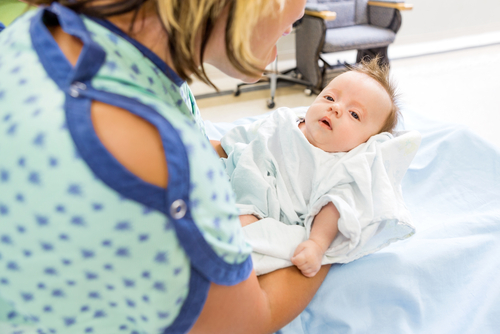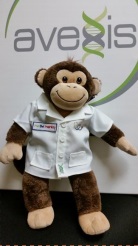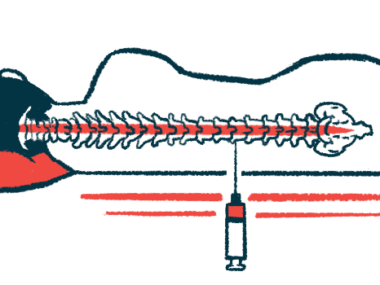AveXis Offers “Mo” the Monkey to Help SMA Patients in Pediatric Trials
Written by |

Conducting clinical trials with pediatric patients is always a challenge, as the age of participants adds additional barriers to the successful completion of a scientific study, as well as adds immense stress on both the child and parents. This is particularly true with Type 1 Spinal Muscular Atrophy, where the life expectancy of babies born with the genetic disease is very short, and there is often little time between an SMA diagnosis and fatal progression of the disease. Therefore, AveXis, a drug development company that uses gene therapy for the treatment of patients with unmet medical needs and orphan diseases such as spinal muscular atrophy (SMA), is offering to each of its pediatric patients enrolled in its current SMA Type 1 clinical trial “Mo” The Monkey, a special friend to help them through the difficult process.
AveXis is currently testing its lead experimental therapy chariSMA, which is in phase I of clinical development with SMA Type 1 infants, and the company has decided to offer each child involved in the study a little Mo the Monkey stuffed animal. The monkey was created a few years ago on February 2nd, and has been named in honor of the mother of the CEO and Founder of AveXis, John A. Carbona.
“‘Mo’ was actually born on February 2, 1938. ‘Mo’ is short for Maureen. Maureen is my mother’s name and Maureen was a lover of animals and children,” explains Carbona in a letter given to the pediatric patients and their families along with Mo. “Besides having three of her own, she foster parented three for five years and was also the town’s Humane Commissioner, caring for hundreds of animals she refused to euthanize.”
The CEO believes that his deceased mother wouldn’t approve of the animal tests conducted by the company “in the name of science,” but he says that improving the quality of life of children who suffer from SMA with their gene therapy and hopefully curing the deadly disease someday is well worth it. “‘Mo’ is meant to honor not only test animals but also my mother, whose untimely death led to me going back to work to make a difference in this world,” he adds in the letter that explains that “Mo” is a gift to both keep the children company on this long journey and “keeping an eye on all our infants in the trial.”
[adrotate group=”3″]
The idea to give a stuffed animal to pediatric patients first began with “Lilly the insulin doll.” As the story goes, Eli Lilly and Company, the first drug company to commercialize insulin, donated free insulin to diabetic children at New England Deaconess Hospital in the 1920s. The children being cared for in the hospital sent Mr. J. K. Lilly Sr. a letter of thanks for his donation, to which Mr. Lilly sent each child a brand-new doll along with a new insulin kit. All of the children named the doll “Lilly” in recognition of his generosity. Later on, a “Lilly the insulin doll” was created in celebration of the 77th anniversary of the discovery of insulin.
AveXis’ Mo the Monkey stuffed animals were approved by an IRB (Institutional Review Board that evaluates approves any material related to clinical trials) and have already been given to the children involved in the trial, which is taking place at the Research Institute at Nationwide Children’s Hospital in Ohio.
Avexis started dosing their SMA type 1 patients in the intermediate cohort of their Gene Transfer Clinical Trial for chariSMA this past December, which is designed to assess the safety and efficacy of the product in a 3-cohort study. This pipeline gene therapy product uses a small virus, called AAV9, which is expected to effectively cross the blood-brain-barrier and deliver functional SMN protein.
The hereditary disease, which is currently ranked the most deadly genetic cause of fatality in infants, causes loss of lower motor neurons, leading to progressive muscle weakness. SMA is related to a genetic abnormality in the SMN1 gene that is responsible for coding functional SMN protein, which is necessary for motor neuron integrity, an abnormality that AveXis expects to treat with their gene therapy.
While the focus of AveXis’ chariSMA trial is to advance their SMA therapy toward becoming the first viable, FDA-approved drug for the disease, the company hopes that this small token will touch the heart soy the children and parents involved in their efforts to treat the disease.




